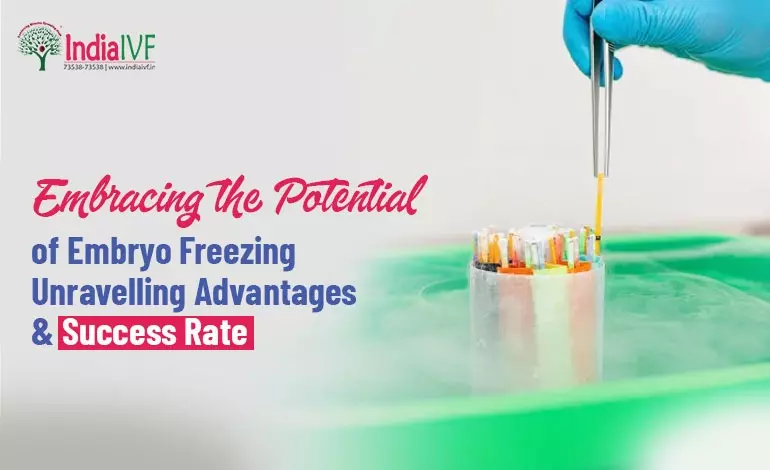Your cart is currently empty!



In the heart of the bustling cities of Delhi, Noida, Gurgaon and Srinagar, lies the beacon of hope for countless couples yearning to experience the joy of parenthood – India IVF Fertility. With their top-notch services, they shed light on the profound concept of embryo freezing and its pivotal role in the realm of fertility treatments. Embryo freezing, or as the scientific world prefers to call it, Cryopreservation, has brought smiles to innumerable faces, and in this article, we delve deep into its advantages and the impressive success rate it boasts of.
Embryo freezing, or Cryopreservation, is a revolutionary process in assisted reproduction where the viable embryos from an In Vitro Fertilisation (IVF) cycle are frozen for future use. These embryos can be thawed and transferred into the uterus when the time is ripe, sometimes even years later. Think of it as a “time capsule,” preserving your chance of having a baby for when the circumstances align perfectly.
Embryo freezing serves as a lifeline for couples grappling with fertility issues. Here’s why:
Also Read: 13 Days After Embryo Transfer No Symptoms
Egg freezing and embryo freezing are two sides of the same coin, each with its own set of advantages. While egg freezing is a fantastic choice for women who wish to preserve their fertility for the future, embryo freezing holds the upper hand when it comes to success rates. An embryo, having undergone the stages of fertilization and cell division, is more likely to lead to a successful pregnancy when compared to a frozen egg that still has to be fertilized.
Embryo freezing might sound like something straight out of a sci-fi movie, but in reality, it is a highly controlled and methodical process. It involves:
The benefits of embryo freezing are abundant:
While the procedure has its advantages, it also comes with certain risks such as the potential damage to embryos during the freezing and thawing process. However, with advanced techniques like vitrification, the chances of this happening have drastically reduced.
According to the Indian Society of Assisted Reproduction, the success rate of IVF cycles using frozen embryos is approximately 50% for women under 35. At India IVF Fertility, the results have been consistently above average, instilling confidence and hope in countless couples.
Theoretically, an embryo can be frozen indefinitely without losing its potential for a successful pregnancy. In fact, there are reports of healthy babies born from embryos frozen for more than a decade!
Embryo freezing or cryopreservation is no less than a boon in the field of fertility treatment. While it might seem daunting, with the right guidance and support from experts like the team at India IVF Fertility, your dreams of parenthood can turn into a joyful reality.
Yes, with advanced techniques such as vitrification, embryo freezing is considered safe.
The cost can vary depending on several factors but generally ranges from INR 30,000 to INR 60,000 per year.
Though rare, potential damage can occur during the freezing and thawing process. However, under proper storage conditions, embryos can remain viable for many years.
Recent studies suggest that pregnancy rates are similar or even slightly higher with frozen embryos compared to fresh ones.
There's no specific limit. However, only viable and good-quality embryos are usually frozen.
The process of freezing doesn't involve any physical discomfort. However, procedures involved in the IVF cycle, such as egg retrieval, might cause mild discomfort.
The process of freezing embryos typically takes about 2-3 weeks, part of a complete IVF cycle.
Yes, frozen embryos can be used after menopause with the help of hormone treatments to prepare the uterus for pregnancy.
Yes, there is a small chance that a transferred frozen embryo could split, resulting in identical twins.
Unused embryos can be stored for future use, donated to other couples, donated for research, or discarded.
At India IVF Clinics we provide the most comprehensive range of services to cover all the requirements at a Fertility clinic including in-house lab, consultations & treatments.